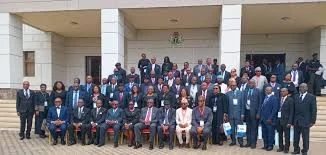The Chief Justice of Nigeria (CJN), Justice Kudirat Kekere-Ekun, has called on judicial officers across the country to play a more proactive role in enforcing safety regulations within the Nigerian Electricity Supply Industry (NESI), in light of disturbing fatality figures recently reported.
Justice Kekere-Ekun made this charge while declaring open the 2025 National Seminar on Regulations in the Power Sector for Judicial Officers in Abuja. The seminar, themed “Navigating the Dynamics of Nigeria’s Evolving Electricity Sector,” was jointly organized by the Nigerian Electricity Regulatory Commission (NERC) and the National Judicial Institute (NJI).
Citing NERC’s 2024 industry report, which recorded 112 electricity-related deaths and 95 injuries, the CJN emphasized that the judiciary must hold operators accountable for non-compliance with safety regulations and ensure that victims receive justice.
“The safety of our citizens must never be treated as incidental. It is a legal and moral imperative,” Kekere-Ekun stated.

She noted that as the electricity sector continues to evolve through legal and structural reforms, judicial oversight becomes even more vital. Judicial pronouncements, she explained, now play a decisive role in shaping investor confidence, protecting consumer rights, and ensuring regulatory consistency.
Kekere-Ekun further urged courts to remain vigilant in reviewing the actions of regulatory agencies such as NERC, particularly when exercising powers such as rate-setting, dispute adjudication, and issuing subsidiary legislation.
“These powers must be exercised fairly, transparently, and subject to judicial oversight. Courts must guard against arbitrariness, protect legitimate expectations, and uphold public participation in regulatory governance,” she said.
Legal Backbone and Collaboration
Also speaking at the event, the Attorney General of the Federation and Minister of Justice, Mr. Lateef Fagbemi, SAN, reiterated the strategic importance of the electricity sector to Nigeria’s socio-economic development, noting its alignment with Sustainable Development Goal 7 (SDG-7), which aims to ensure universal access to modern and sustainable energy.
According to Fagbemi, the Electricity Act, 2023 represents a landmark shift by introducing a dual regulatory framework that empowers both federal and state actors in the management of electricity generation, transmission, and distribution.

“The legal complexities of this transformation call for enhanced collaboration between the executive and judiciary to ensure that the reforms are not undermined by conflicting or uninformed legal interpretations,” he said.
He assured judicial officers of the Federal Ministry of Justice’s continued support in enhancing their understanding and interpretation of the regulatory frameworks guiding the electricity industry.
Power Sector Challenges and Judicial Impact
In his remarks, the Chairman of NERC, Mr. Sanusi Garba—represented by Vice Chairman, Mr. Musiliu Oseni—emphasized the judiciary’s influence in either advancing or hindering the development of the power sector.
He referenced past judicial decisions such as the Manufacturers Association of Nigeria (MAN) case (2015) and the Toluwani case (2016), both of which had long-term regulatory and operational implications for NERC. These examples, he said, demonstrate the critical need for judges to understand the sector’s technicalities before issuing rulings.
“Investments follow legal certainty. If investors cannot predict or rely on judicial interpretation, they will simply look elsewhere,” Garba warned.
He clarified that the seminar’s objective was not to interfere with judicial discretion but to equip judges with adequate industry knowledge to render informed decisions.
The Way Forward
The Administrator of the NJI, Justice Salisu Garba, stated that the seminar was timely, given the sector’s increasing complexity, technological advancement, and the ongoing implementation of recent legal reforms.
“We believe this seminar will enhance judicial understanding and encourage collaboration, all aimed at fostering a more sustainable and investor-friendly electricity industry in Nigeria,” he said.
Justice Kekere-Ekun concluded by reminding participants that the judiciary’s vigilance remains essential in ensuring that the regulatory environment in the power sector upholds justice, transparency, and the rule of law.









